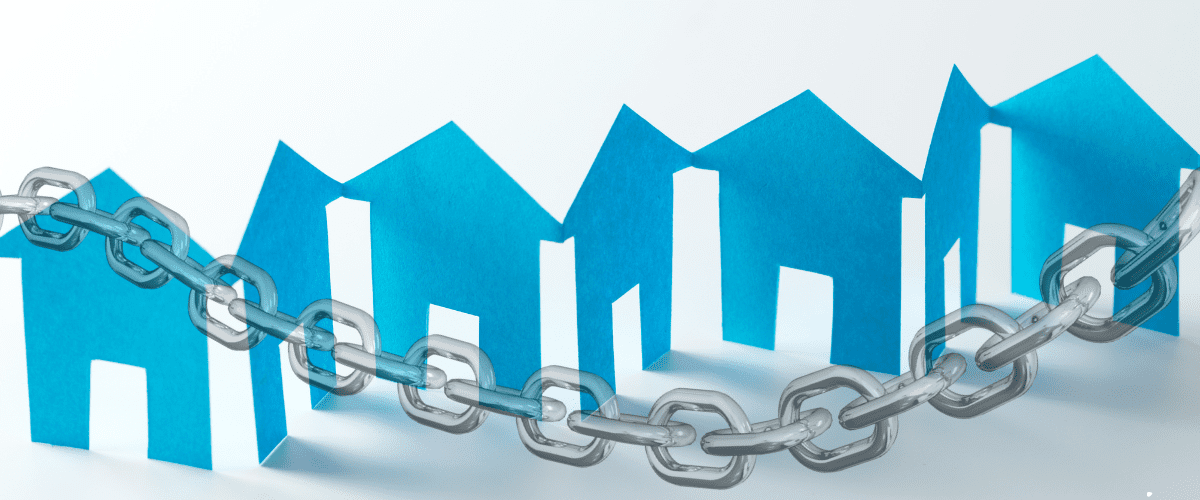Navigating The Chaos If Your Housing Chain Breaks
Property chains are a common element of the UK housing market, and in most cases, the successful purchase of a property or home sale depends on at least one other property completing too. This sequence of interconnected transactions is the property chain, and it can lead to significant delays and complications. But if your housing chain breaks, what options are you left with and how can you make it as stress-free as possible?
Why Might The Property Chain Break?
There are several reasons why a property chain might collapse. A change in circumstances like losing a job or a sudden illness might force the buyer or seller to withdraw from the chain. Issues found in a property survey that would be costly to repair, like structural issues, can also cause a buyer to back out and search for a different home, which leaves the seller in a difficult situation.
If the buyer fails to secure their mortgage, the agreed price might not be viable which can also result in the chain breaking down. Gazumping is another issue that is unfortunately common in UK property transactions—this is where a seller accepts a higher offer on their property, despite having accepted a previous offer.
How Long Is The Average Property Chain?
Every property chain is different, and the variables can change, from the price of the property to the complexity of the chain. Some chains are only three links long, while others can be entangled in a chain of ten exchanges or more. Typically, a home move in the UK takes between three and six months to complete. But depending on whether you’re a cash buyer, you or your buyer have already sold your home, and the number of properties involved in the chain, it can be quicker or slower.
What Should You Do Next?
Depending on the circumstances of the chain failing, there might be things you can do to repair the break in proceedings. For example, you might consider bridging finance to help the chain move forward while you’re waiting for your property to sell. Another option is to have your estate agent get in touch with any other interested buyers, ideally who are purchasing with cash, to move the sale along more quickly.
Find Out if A Renegotiation Is Possible
If your buyer is the one who has broken the chain, you may want to try renegotiating with them to see if you can come to an agreement that would lead to completion. Renegotiating the purchase price at the last minute can be difficult, but depending on why your buyer has decided to pull out of the purchase, and how much they want the property discounted by, it may be a reasonable decision. It costs nothing to have the conversation and could save you time and money needing to find another buyer.
Arrange Temporary Accommodation
If you’ve already sold your property and the chain has broken down further into the process, you’ll need to arrange temporary accommodation until you find your next property. That might mean staying with family or friends, renting an Airbnb, or looking into short-term rental options that will give you more time to figure out what your next steps are.
Book A Storage Unit
If you’ve been proactive and already started boxing up your belongings, it can be difficult to know what to do when a sale or purchase falls through. This is especially true if you’re no longer able to move to your new property because your buyer has retracted their offer.
Moving your belongings into a storage unit takes some of the stress out of the situation, as you’ll know that your items are safe. Storage units offer flexibility, allowing you to access your belongings whenever needed, whether it’s for a short-term delay or an extended period. Securing a storage space means you can focus on resolving your housing situation without the added worry of managing packed boxes, furniture, and other personal items.
Stay Prepared
It’s important to have everything ready, not only for the eventuality of a chain breaking but also in the event that you find a new buyer. Make sure that all your paperwork is accessible, communicate regularly with whoever is handling your sale or purchase, and do what you can to keep the momentum going where possible.
Protect Yourself With Insurance
Home buyer’s protection insurance can help you recover the costs associated with a failed sale, like survey costs, mortgage arrangement fees, or conveyancing costs. If your property chain has broken down through no fault of your own, it’s worth contacting your insurance company to see what can be done to protect your finances as much as possible.
A broken property chain can be frustrating and stressful, but it doesn’t have to derail your home-buying (or selling) journey entirely. Make sure you stay proactive. Explore alternative options like bridging finance or renegotiation if it will keep the process moving along, and make practical arrangements such as temporary accommodation and storage to minimise disruption and keep your plans on track.
Preparing for potential setbacks and securing home buyer’s protection insurance can also provide peace of mind, keeping you financially protected in case of unexpected challenges. While the process can be unpredictable, staying informed and adaptable will help you navigate the chaos and move forward with confidence.
If you’re in need of professional moving and storage services, get in touch with PODS today for a personalised quote.





